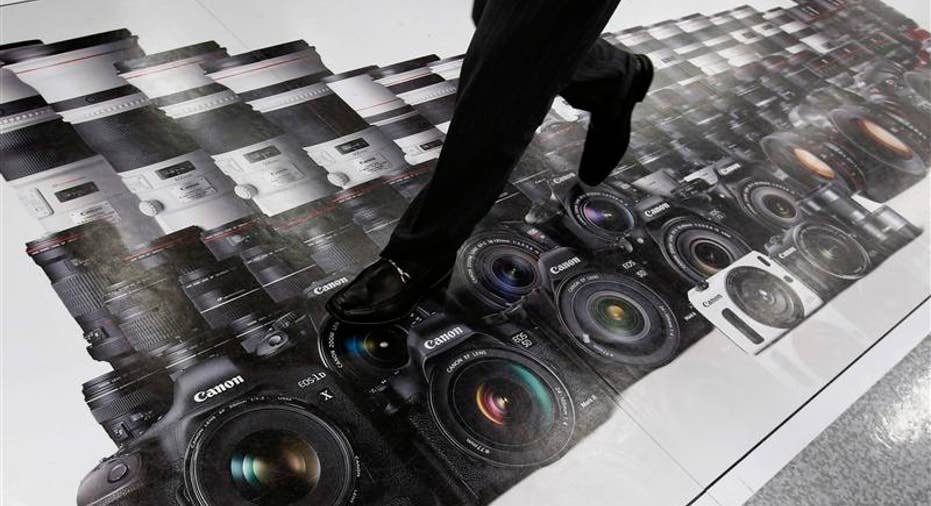Canon, Nintendo find solace in Abenomics as weaker yen boosts outlook

TOKYO – Super Mario creator Nintendo Co Ltd forecast a return to the black after two years of losses and camera maker Canon Inc raised its profit forecast by nearly 10 percent as a weaker yen, spurred by aggressive deflation-fighting policies, bolstered the outlook of Japan's tech companies.
The two companies, however, show no sign of reciprocating the government's helping hand with fresh job-creating investment. Canon, still worried about a struggling global economy, pared its capital expenditure.
As the first blue-chip Japanese tech companies to report quarterly results, Nintendo and Canon are often seen as a barometer for the sector's earnings. The tech sector directly employs around 2 million workers in Japan.
"We welcome Abenomics," Canon Chief Financial Officer Toshizo Tanaka said at a news briefing, acknowledging the impact of Prime Minister Shinzo Abe's economic stimulus policies.
"The Japanese economy moves on this kind of mood so we value this and hope to find success," he added.
At Canon, a weakening yen is helping to compensate for a squeeze on compact camera sales as consumers switch to photo snapping on their smartphones. And the softer Japanese currency may buy Nintendo more time to plug its Wii game console successor, the Wii U, which has disappointed with dull sales as it also competes with smartphones and tablets.
For the business year to December 31, Canon, which relies on foreign markets for four-fifths of its sales, lifted its operating profit forecast to 450 billion yen ($4.53 billion).
Nintendo, which generates three-quarters of its revenue abroad, forecast an operating profit of 100 billion yen after two years of losses as its Wii boom ebbed.
Canon raised its forecast dollar rate for the year to 95 yen compared with the 85 yen forecast issued just three months earlier.
Nintendo estimated a rate of 90 yen to the dollar for the year to next March. Its president, Satoru Iwata, told a news briefing in Osaka that the figure was "conservative".
Nintendo sold 3.45 million Wii U consoles from its November launch until March 31, far below the 5.5 million it initially predicted. For this business year, it is aiming to sell 9 million.
LONG-HELD WISH
For Japanese business leaders worried about their ability to compete globally, particularly against South Korean rivals such as Samsung Electronics Co Ltd and LG Electronics Inc, the yen decline fulfils a long-held wish.
Fabricating goods worth almost $400 billion a year, Japanese makers of TVs, mobile phones, printers and personal computers account for a sizeable chunk of Japan's $5 trillion economy.
Canon's operating profit in the first quarter dipped 34 percent to $552 million, which the company blamed on a weakened global economy and the hit to its compact camera business from smartphones. Nintendo posted a full-year operating loss of 36.4 billion yen.
Corporate heads who have praised Abenomics include Sony Corp CEO Kazuo Hirai. His company and other Japanese TV makers, Panasonic Corp and Sharp Corp, have struggled to fend off competition from Samsung Electronics as a strong yen bit into profits.
Sony, with its bigger exposure to overseas markets, is the best-placed among TV makers to gain from a weaker yen, particularly versus the euro. A 1 yen drop against the European single currency adds about 6 billion yen to operating profit at the maker of Bravia sets.
At Panasonic, a 1 yen weakening against the euro boosts operating profit by 2 billion yen, while it reaps a 2.5 billion yen gain for declines against the dollar. At Sharp, which more heavily relies on its home market, a 1 yen move is worth around 500 million yen in operating profit against the euro and 700 million yen against the dollar.
More than a third of Japanese companies remain worried about domestic demand stagnating, a Reuters survey of 240 companies released on Friday shows. A quarter said they were likely to increase output in Japan because of the weaker yen.
On balance, however, Wednesday's results produced no signs that Abenomics was encouraging a boost in capital spending.
Canon, which stands to benefit more than most Japanese companies from a weak yen, on Wednesday trimmed its capital expenditure for the business year to 265 billion yen from 270 billion yen.
"Dramatic monetary easing has prompted a revision of the strong yen, but there are still uncertainties surrounding the U.S. budget problems and European debt issues," Tanaka cautioned.
Since mid-November, when an Abenomics-driven stock rally began, Canon's shares have gained 58 percent, in line with a 60 percent gain in the Nikkei 225 benchmark index. Its stock rose 1.3 percent in Tokyo to 3,840 yen on Wednesday.
Nintendo, which has gained 17 percent since November, rose 4.6 percent to 11,950 yen. Quarterly results for both companies were released after the close of trading.
($1 = 99.3600 Japanese yen)
(Editing by Daniel Magnowski and Edmund Klamann)



















